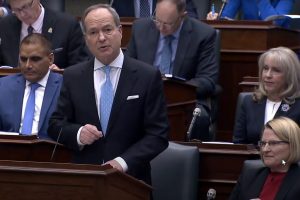Organizing an industry association to lobby for change is always a challenge but when the group contains both management and trade union representatives of the construction industry it’s more complex.
“董事会必须平衡专注所以他们瞧ok for issues which will benefit everyone and avoid other issues,” says Andy Manahan, executive director of the Residential and Civil Construction Alliance of Ontario (RCCAO) which was formed in 2005 with a vision to drive the construction sector forward so all stakeholders could benefit.
“And given the make up of the board, there are some issues we generally avoid.”
As such, says Manahan, the plan from the outset was to establish the RCCAO brand as thought leaders in construction through credible, authoritative research, which would not just add to the conversation but drive it.
“Right out of the gate that was the plan, to commission the best academic consultant advice and that hasn’t changed,” he says.
“Though, as any industry association will attest, there are the shared frustrations of getting the attention of government to ensure their ideas aren’t just being skimmed and ignored.
“You want people to actually read the reports, especially at the provincial minister level. That’s the hard part. They have people who will read the reports on staff but often it’s just the executive summary. Then you get lucky with ministers, like Donna Cansfield when she was Minister of Transportation (MTO), she’d come to meetings with her written notations in the margins.”
Getting anyone’s attention for anything in the digital world is difficult because there’s a constant demand from mobile and computer screens to phone calls and meetings. RCCAO is also amplifying its messaging beyond a website, email blasts and Twitter, to hosting videos on its own YouTube channel.
RCCAO are relative newcomers to the construction association world but they’ve wasted no time in forming alliances with other associations based on mutual interest, says Manahan.
It didn’t take long for the lead-through-research strategy to pay off. Their 2007 report, Bridging the Gap, looked at the shortfall in infrastructure funding for bridge maintenance and replacement.
“Timing, of course, is everything,” says Manahan.
“That was the year of the fatal bridge collapse in Laval, Que. and then a collapse in Minneapolis.”
Even though we’re a provincial organization, we’re punching above our weight
— Andy Manahan
Residential and Civil Construction Alliance of Ontario
Those incidents helped drive their report to the highest echelons of government, where stakeholders were anxious to avoid a collapse in their jurisdictions.
“The media coverage was phenomenal on our report. We ended up having many discussions with municipalities and the province and while it’s taken some time, we’re seeing funding for repairs and maintenance restored to MTO budgets,” he says noting RCCAO partnered with the Ontario Good Roads Association (OGRA) on that report.
More recently RCCAO has joined with its stablemate RESCON in pushing for a streamlining of development approvals process.
It’s been a long campaign stretching back to 2009 when RCCAO released its Environmental Assessment Reform — A Tool for Economic Recovery report, looking at the myriad of delays in the Municipal Class Environmental Assessment (MCEA) process.
The report noted “shovel ready” projects which would have qualified for federal infrastructure stimulus funding were being set back an average of 10 months because the MCEA process took almost 20 months. Lawyer Frank Zechner’s follow-up study in 2014 found the process had lengthened to more than 26.5 months.
在所有有五MCEA公关报告ocess and a chorus of voices from several construction groups seems to have brought a streamlined process a step closer, says Manahan.
Similarly, it has collaborated with the like-minded Ontario Municipal Engineers Association (MEA), which has been frustrated at getting the attention of successive provincial ministers to acknowledge the importance of reforming the approvals process — which its member manage and also find cumbersome.
Last year RCCAO and MEA submitted a joint application to the Environmental Commissioner of Ontario which was endorsed by 13 separate industry and professional associations such as the Ontario Sewer and Watermain Construction Association, OGRA, the Ontario Road Builders’ Association and the Ontario General Contractor’s Association.
It called for a general streamlining and expediting of the processes under the MCEA and expediting the response process while also harmonizing the MCEA with the Planning Act processes.
Looking ahead, Manahan says, the RCCAO is dipping its toes in the federal pond, having been invited to Ottawa to present to the Standing Committee on Finance looking at the Infrastructure Bank concept and exploring ways where the federal government might use its resources to drive economic activity through the construction sector.
“Even though we’re a provincial organization, we’re punching above our weight,” he says.









Recent Comments
comments for this post are closed